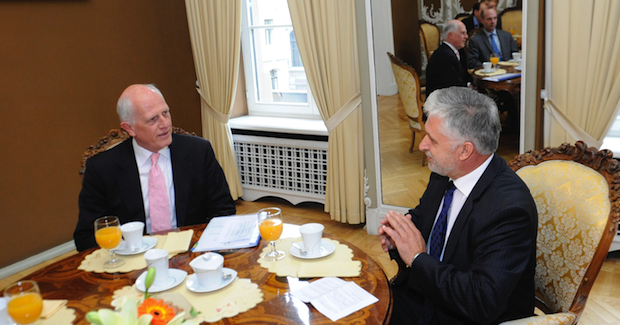Russell Trood: A Voice for the National Interest

The death of Russell Trood took from Australia a well-respected academic, senator and foreign policy mind. His foreign policy approach, based on the concept of national interest, is sorely missed in today’s partisan parliamentary environment. What does Russell Trood’s experience tell us about Canberra’s regard for international affairs?
On 3 February, the Recital Hall of the Queensland Conservatorium was filled to capacity in celebration of the life and legacy of Russell Trood. Russell was elected a Fellow of the Australian Institute of International Affairs in 2016, in recognition of his outstanding contribution to the study and practice of Australian international affairs. As a professor, a senator, a special diplomatic envoy and a profound thinker, Russell was in a class of his own—gifted with an enviable range of talents. His success in all these roles—though it often appeared effortless—was in every case carefully earned and thoroughly merited.
Russell was a firm believer in the concept of the national interest. I recall a memorable lunch at Parliament House over which we agreed that most of the terrain of foreign affairs and trade could be navigated without any major reference to domestic political differences. Consequently, the pursuit of the national interest could and should attract bipartisan support and a political leader who too readily articulated partisan rhetoric on foreign policy issues deserved repudiation. Contrary to some users of the concept, however, Russell was also convinced of the value for the national interest of working within properly constructed international institutions, a view which lay behind his role in later years as president of the United Nations Association in Australia.
In a ceremony in which parliament and parliamentarians loomed large, Russell many accomplishments were recounted and celebrated. The first of the tributes was delivered by Attorney-General Senator George Brandis, he was followed by the Senate President, Stephen Parry, and then former Senator and colleague Michael Ronaldson. De mortuis nihil nisi bonum—of the dead, nothing but good—is the right formula for all such occasions, but in Russell’s case it was also the just formula. Here was a person of immense capability, unshakeable integrity, and great industry, who improved every sphere he touched. As one who knew him a little, I would add, he was also unfailingly good humoured and a pleasure with whom to spend any time.
These testimonies, while they were sincere and appropriately unqualified, nevertheless generated a slight disquiet. Senator Brandis went so far as to say that had Russell remained in the parliament he would have become a front bench member of the Turnbull government. Yet none of the parliamentarians, present and past, addressed the puzzle that must have occurred to most in the auditorium. If he had such talents, and manifestly possessed so much to offer, why was his career cut so short? He served but a single term.
Indeed, Senator Brandis also claimed that his election in the first place was close to a fluke, it being an event without precedent—under current electoral arrangements—that so many candidates from the conservative side of politics were elected on a Senate ticket for Queensland. The historians in the audience would have known, perhaps, that in the Senate elections of the 1920s Queenslanders elected only Nationalist Party candidates.
The event was also to have its academic contributors. In a liberal democracy, academics—whatever their other roles may be—have the function of speaking truth to power. Russell never forgot this fundamental duty. As Senator Brandis reminded the meeting, Russell spoke out during the Howard era on the folly of invading Iraq and in retrospect, as he further admitted, who would gainsay the truth of this proposition.
The vice-chancellor opened the proceedings, but the academics followed the parliamentarians and much more was heard about Russell’s political career and promise than about his academic work. Nonetheless, the encomia of the academics were appropriately generous and measured, and we learned much about Russell the committed family man and Russell the academic mentor and builder, and in each of these divisions he was undoubtedly in very rare company. But they did not address the conundrum that the remarks of the speakers coming before them had implicitly posed.
Several answers nevertheless suggested themselves. Russell was a major figure contributing to intelligent thinking on international affairs, but few politicians have been able to use such expertise as a base for a successful political career. Perhaps Russell was too liberal a figure, Senator Brandis recalling that in a stint in the United Kingdom Russell worked not for the Conservative but for the Liberal Party interest—playing a small role in the Sutton and Cheam by-election, which achieved a swing to the Liberal candidate of previously unheard of proportions. Or perhaps his fearless articulation of his view of the national interest did not fit the times, being unpalatable to those who preferred every policy dish to be partisan flavoured.
If any or all of these were contributing factors, then the explanation would seem to be that Australian parliamentary institutions are of such poor quality that even an outstanding figure will be denied if party machines decide otherwise. Senator Brandis bemoaned the decline in the quality of the debate in the Senate and criticised the vituperative quality of many of the contributions to that debate. He did not, however, draw the inference that such will be the case as long as even a talent as brilliant and committed as Russell’s can only enjoy but a brief appearance.
James Cotton FAIIA is Emeritus Professor, University of NSW, Australian Defence Force Academy and a fellow of the Australian Institute of International Affairs.
Read Adam Kamradt-Scott’s tribute to Russell Trood here.
This article is published under a Creative Commons Licence and may be republished with attribution.